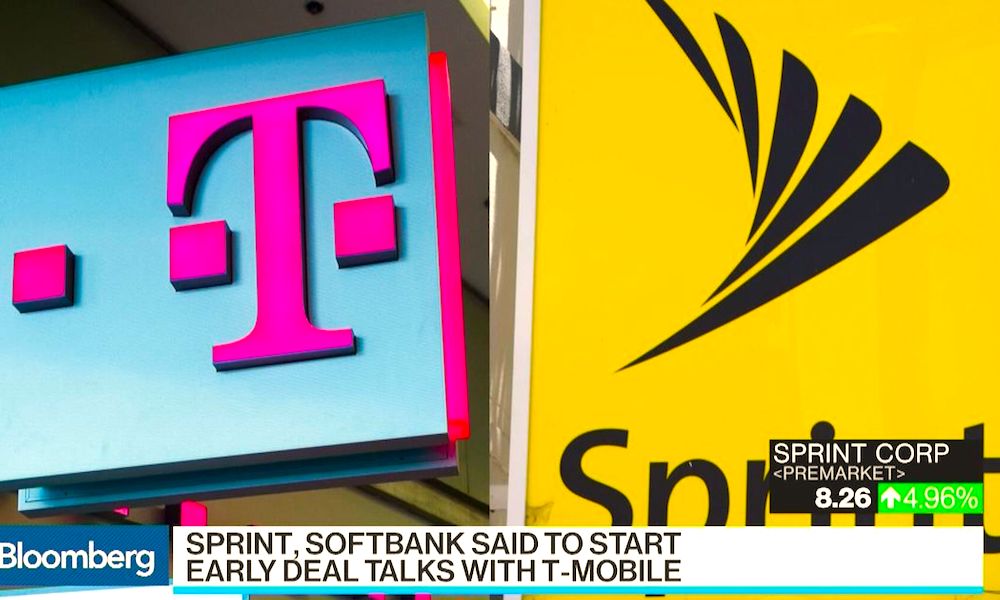Why the T-Mobile/Sprint Merger Failed and What It Means for You
 Credit: Bloomberg
Credit: Bloomberg
Toggle Dark Mode
It was nearly four years ago when news broke that T-Mobile and Sprint were looking to ‘tie the knot’ as part of a rumored $32 billion deal that would’ve essentially blended the nation’s third- and fourth-largest wireless carriers into one. And though the earliest talks proved unsuccessful, European-based Deutsche Telecom AG, and Japan’s Softbank Group — the majority owners of T-Mobile and Sprint in the U.S. — have since been entangled in back-and-forth buyout talks unlike the industry has ever seen before.
We shared news of their most recent attempt to seal the deal few months ago; and while those talks initially appeared to be heading in the right direction, a source familiar with them told Axios that Sprint and T-Mobile merger talks have fallen completely flat (over a casual dinner in Tokyo, Japan last Friday, of all places).
It was actually Deutsche Telecom CEO, Timotheus Höttges, the source said, who during the dinner presented Softbank CEO, Masayoshi Son, and Sprint CEO, Mercelo Claure, with a “revised version” of their pending agreement, which interestingly left all parties in utter disagreement over who would ultimately control the newly combined company.
Now, in his first public comments since the talks fizzled out on Friday, Son has revealed why he decided to bring an end to them, defending the decision and saying that it ultimately came down to a matter of Softbank retaining its majority ownership of Sprint’s network in the U.S.
“Basically, we didn’t think we should be agreeing to a deal that would result in our loss of control,” Son told Bloomberg at a press briefing on the sidelines of Softbank’s quarterly earnings call. “There was just a line we couldn’t cross. And that’s how we arrived at the conclusion.”
At this point, it’s unlikely that we’ll ever hear anything about a Sprint / T-Mobile merger again. However worth noting, of course, is that “a merger” was never really Softbank’s intention when acquiring its stake in Sprint, anyways — but only so that it could gain a foothold in the ever-competitive U.S. wireless market, which has been dominated for years by Verizon and AT&T, respectively, with regards to their massive subscriber bases.
What’s Next?
However Son, whose tech investments and telecom holdings in the U.S. and Japan cover millions of subscribers, isn’t about to let the latest fallout deter him. Rather, noting specifically that “having U.S. telecom infrastructure is essential,” Son pointed out how Softbank has plans for a number of upcoming investments, including those in the Victory Fund — a collective, $100 billion joint investment funded by Softbank, Saudi Arabia, and other key backers intended to encourage more investment in technology startups abroad.
What This Means for You
Meanwhile, Softbank on Sunday indicated that in the near-term, it plans to increase its holdings of Sprint by up to 85% through share purchases on the open market, in a move that would suggest the telecom-titan is looking to hunker down for a while and focus on improving the network, as opposed to seeking another merger prospect.
“At this point, maybe [Masayoshi Son] has to give up on strategic options and simply invest in the U.S. to make Sprint’s network and brand competitive,” said Walt Piecyk, an analyst at investment firm, BTIG LLC.
Finally, although news of the fallout ultimately sent Sprint’s (NASDAQ: S) stock price tumbling on Monday, the good news is that at least for the foreseeable future, Sprint and T-Mobile customers won’t have to worry about being sandbagged by any unsubstantiated “adjustments” to their otherwise competitive monthly service rates, since business is merely carrying on as usual.






